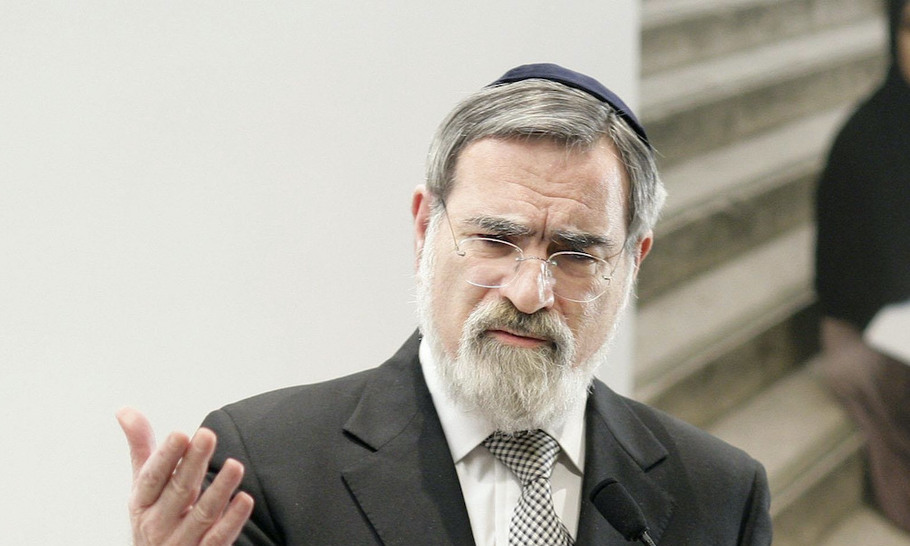The Jew and the Catholic

Chief Rabbi Sir Jonathan Sacks (Edmond Terakopian/Pool/PA)
In his final Thought for the Day on 22 May, Jonathan Sacks spoke of the Book of Ruth, whose theme is kindness. Naomi is left a childless widow, the most vulnerable of all positions in the ancient world because there is no one to look after you. The story begins with bereavement, isolation and depression but ends with joy. Sacks moved from the story of Naomi, three thousand years ago, to coronavirus and the numerous acts of kindness during this period. “When fate was cruel to us, we were kind to one another”, “lifting others we ourselves are lifted.”
Lord Sacks, Chief Rabbi from 1991-2013, died of cancer on Saturday. He was the only chief rabbi to be born in postwar Britain. His predecessor, Immanuel Jakobovits was a German refugee, born in Königsberg in East Prussia. Sacks was not just born after the war, he was born after the Holocaust, part of that generation of rabbis who had to come to terms with questions of God and evil, forgiveness and reconciliation.
He wrote more than twenty books, about Judaism, God and science, morality, philosophy, “tradition in an untraditional age” and humanist culture. In his book From Optimism to Hope he wrote of Tolstoy, Hobbes and Freud, Hegel, Auden and Swift. But in recent years he turned increasingly to the rise of anti-Semitism in the Labour Party under Jeremy Corbyn. In 2018, in the House of Lords, he said, “Anti-Semitism, or any hate, becomes dangerous when three things happen. First, when it moves from the fringes of politics to a mainstream party and its leadership. Second, when a party sees that its popularity with the general public is not hared thereby. And three, when those who stand up and protest are vilified and abused for doing so. All three factors exist in Britain now.”
In these last statements, in the House of Lords and on Thought for the Day, Sacks grappled with the problems of anti-Semitism, acts of kindness and times of despair.
In his speeches over the past few days, Joe Biden, a devout and lifelong Catholic, spoke to an America, reeling from coronavirus and economic crisis, more bitterly divided than at any time in the last fifty years, and he spoke of bringing America together. “It is the time,” he said on Saturday night, “to heal in America.” “For all those of you who voted for President Trump, I understand the disappointment,” Biden said in Wilmington, Delaware. “It’s time to put away the harsh rhetoric, lower the temperature, see each other again.”
Is this possible? That is the question facing America in the years to come. Statues and flags from the Civil War are still fiercely resonant and divisive. This summer’s riots and the appearance of white right-wing militias brought violence to American cities. America is divided over gun control, abortion, healthcare and how to handle coronavirus. It is not just divided — it is split right down the middle. In 2012 President Obama won but took only 51.1 per cent of the vote. In 2016 Trump won but with only 46.1 per cent. The latest estimates for Joe Biden and Kamala Harris at the time of writing are 50.6 per cent of the vote. All three elections were close. Reagan in 1984 was the last time a US president got more than 54 per cent of the vote.
Above all, there is race. Many parts of rural white America have not recovered from the shock of a black president. How will they react to a black Vice President, who may well become America’s first black female president? In the past few months, we have seen truckloads of white men with shotguns riding into cities or lining main streets during times of civil disturbance. At Saturday’s celebrations in Wilmington for the Biden-Harris victory, when the first fireworks went off, Harris jumped as if she’d heard a gun go off. Where there’s fierce division, violence may not be far away.
The reaction of Trump’s America to electoral defeat is similar to the reaction of post-World War One Germany in 1918. It’s as if they have been stabbed in the back. They cannot accept defeat — and who knows where this will lead? At best to recounts and law courts. At worst?
Sacks the Jew, and Biden the Catholic, preach the language of healing divisions, of kindness replacing bitterness. That’s the language we need to hear. But are we sure all of America is listening? Have the spectres of anti-Semitism and racism really gone with Corbyn and Trump? Social media in Britain is full of the vilest anti-Semitic abuse following the suspension of Corbyn and even greeting the death of Rabbi Sacks. In America, tens of millions voted for a black Vice President. Almost seventy million didn’t. The paranoid style, as Richard Hofstadter called it, has not gone away.
A Message from TheArticle
We are the only publication that’s committed to covering every angle. We have an important contribution to make, one that’s needed now more than ever, and we need your help to continue publishing throughout the pandemic. So please, make a donation.





